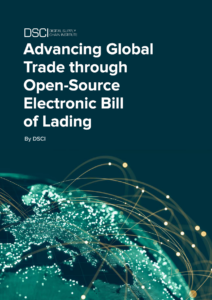The bill of lading (B/L) is essential for global trade, but traditional paper-based B/Ls have significant drawbacks, including inefficiencies, delays, errors, and increased fraud risks. The Digital Container Shipping Association (DCSA) aims to shift to 50% digital issuance of B/Ls by 2028 and fully adopt electronic B/Ls (eBL) by 2030. However, this transition faces resistance, legal complexities, and technological limitations.
Introducing Open eBL: A New Era in Shipping Documentation
The Digital Supply Chain Institute (DSCI) offers a groundbreaking solution with Open eBL, an open-source eBL platform focusing initially on the House Bill of Ladings (HBLs). Open eBL aims to modernize shipping documentation, enhancing efficiency, security, and sustainability.
Key Functions of the Bill of Lading
- Receipt of Goods: Confirms goods have been loaded safely, noting quantity and quality.
- Evidence of Contract: Serves as proof of an agreement to transport goods.
- Document of Title: Allows receivers to claim goods at the destination port.
Advantages of Open-Source e-Bill of Lading Over Traditional B/L
- Efficiency: Instant issuance and transfer, reducing costs and delays.
- Security: Reduced risk of loss, damage, or forgery.
- Cost-Effective: Potential savings of $4 billion annually in the shipping industry.
- Reliability: Ensures timely receipt of necessary documents, preventing additional costs.
Benefits of an Open-Source Approach
- Accessibility: Ensures widespread adoption and equality of access.
- Global Collaboration: Encourages contributions from developers worldwide.
- Defensibility: Creates a resilient community supporting the platform.
- Sustainability: Ensures long-term stability beyond any single service provider.
A Call to Action
The shift to Open-Source e-Bill of Lading marks a significant advancement in global trade. While challenges exist, such as integrating with existing systems and establishing global standards, the benefits are substantial. Open eBL stands at the forefront of this transition, offering a simple, robust, compatible, and secure framework.
Industry leaders must commit to creating a supportive ecosystem, overcoming resistance, and harmonizing international regulations. The strategic adoption of Open-Source e-Bill of Lading can drive substantial change, leading to streamlined operations and eco-friendly practices.
Join us in transforming global trade. Embrace the future with Open eBL and be part of a more efficient, secure, and sustainable supply chain.
Complete the form below to download the report.
"*" indicates required fields


